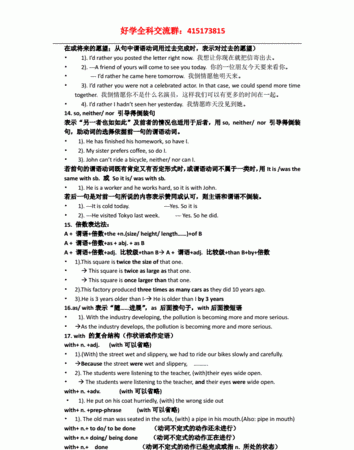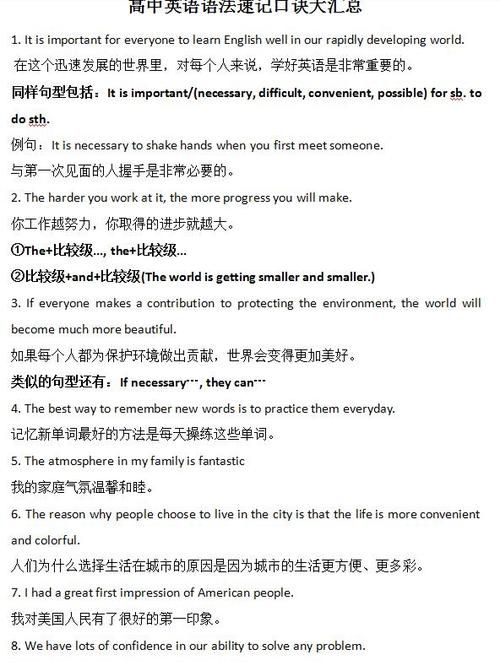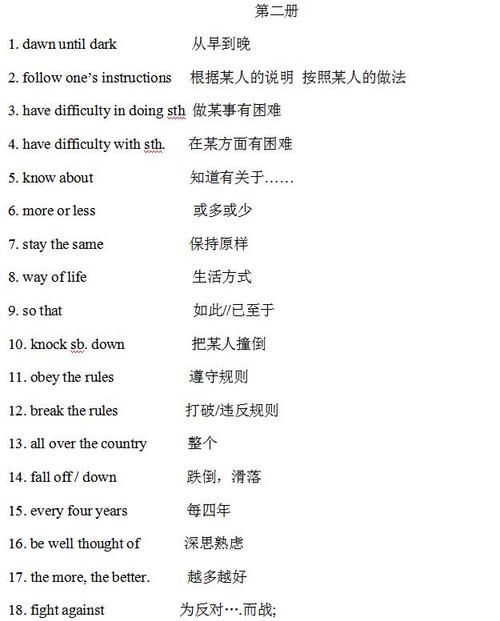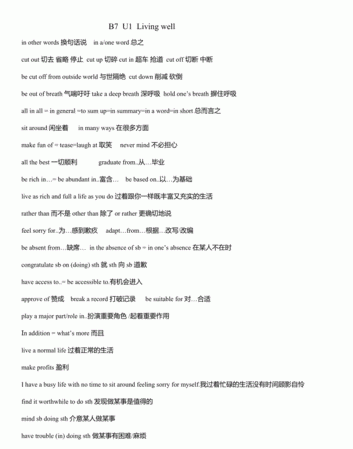本文目录
高中英语重点句型归纳总结
1. welcome to sp 欢迎到某地
Eg. Welcome toChina.
2. What's the matter withsb. / sth? 出什么毛病了?
Eg. What's the matterwith your watch?
3. be different from 与......不同
Eg. The weather in Beijing is different from that of Nanjing.
4. be the same as 与……相同
Eg. His trousers are thesame as mine.
5. be friendly to sb. 对某人友好
Eg. Mr. Wang is veryfriendly to us.
6. want to do sth. 想做某事
Eg. I want to go toschool.
7. want sb. to do sth. 想让某人做某事
Eg. I want my son to goto school.
8. what to do 做什么
Eg. We don't know what todo next.
9. let sb. do sth. 让某人做某事
Eg. Let him enter theroom.
10. let sb. not do sth. 让某人不做某人
Eg. Let him not stand inthe rain.4
11. why don't you do sth?
怎么不做某事呢?
Eg. Why don't you playfootball with us?
12. why not do sth.? 怎么不做某事呢?
Eg. Why not play footballwith us?
13. make sb. sth. 为某人制造某物
Eg. My father made me akite.
14. make sth for sb. 为某人制造某物
Eg. My father made a kitefor me.
15. What …mean by …? 做……是什么意思?
Eg. What do you mean bydoing that?
16. like doing sth. 喜欢做某事
Eg. Jim likes swimming.
17. like to do sth. 喜欢做某事
Eg. He doesn't like toswim now.
18. feel like doing sth. 想做某事
Eg. I feel like eatingbananas.
19. would like to do sth.愿意做某事
Eg. Would you like to gorowing with me?
20. would like sb. to dosth. 愿意某人做某事
Eg. I’d like you to staywith me tonight.
21. make sb. do sth. 使某人做某事
Eg. His brother oftenmakes him stay in the sun.
22. let sb. do sth. 让某人做某事
Eg. Let me sing a songfor you.
23. have sb. do sth. 使某人做某事
Eg. You shouldn't havethe students work so hard.
24. be far from sp 离某地远
Eg. His school is farfrom his home.
25. be near to sp 离某地近
Eg. The hospital is nearto the post office.
26. be good at sth. /doing sth. 擅长某事/做某事
Eg.They are good atboating.
27. It takes sb. sometime to do sth. 某人花多少时间做某事
Eg. It took me more thana year to learn to draw a beautiful horse in five minutes.
28. sb. spends some time/ money (in) doing sth. 某人花多少时间做某事
Eg. I spent twenty yearsin writing the novel.
29. sb. spends some time/ money on sth. 某事花了某人多少时间/金钱
Eg. Jim spent 1000 yuanon the bike.
30. sth. costs sb. somemoney. 某物花了某人多少钱
Eg. The bike cost Jim1000 yuan.
31. sb. pays some moneyfor sth. 某人为某物付了多少钱
Eg. Jim paid 1000 yuanfor the bike.
32. begin / start withsth. 开始做某事
Eg. The started themeeting with a song.
33. be going to do sth. 打算做某事
Eg. We are going to studyinJapan.
34. call A B 叫 A B
Eg. They called thevillage Gumtree.
35. thank sb. forsth./doing sth. 感谢某人做某事
Eg. Thank you for yourhelp.
36. What ……for? 为什么
Eg. What do you learnEnglish for?
37. How/ what about doingsth.?做某事怎么样?
Eg. How about goingfishing?
38. Sb +be+ the+最高级+of/in短语
Eg. Lucy is the tallestin her class.
39. Sb + be +比较级+than any other + n.
Eg. Lucy is taller thanany other student in her class.
40. have to do sth. 不得不做某事
Eg. I have to go homenow.
41. had better do sth. 最好做某事
Eg. You'd better studyhard at English.
42. had better not dosth. 最好别做某事
Eg. You'd better not stayup.
43. help sb. to do sth. 帮助某人做某事
Eg. Lucy often helps Lilyto wash her clothes.
44. help sb. do sth. 帮助某人做某事
Eg. He usually helps melearn English.
45. help sb. with sth. 帮助某人做某事
Eg. I sometimes help mymother with
46. the housework make it+时间把时间定在几点
Eg. Let's make it 8:30.
47. take sb. to sp 带某人到某地
Eg. Mr. Wang will take usto the Summer Palace next Sunday.
49. have nothing to do(with sb) 与某人没有关系
Eg. That has nothing todo with me.
50. 主语+ don't think + 从句认为……不……
Eg. I don't think it willrain tomorrow.
51. It's + adj.+ for sb.to do sth. 做某事对某人来说怎么样
Eg. It is lucky for youto go to London.
52. How + adj / adv + 主+ 谓!多么……啊!
Eg. How beautiful theflower is!
53. what + a / an + adj +n + 主+ 谓!
Eg. What an beautifulflower it is!
54. What + adj+ pl. / [u]+主+ 谓!
Eg. What bad weather itis today!
55. find it + adj+ to dosth. 发现做某事如何
Eg. I find it hard tospeak English well!
56. ask sb. for sth. 向某人要某物
Eg. They often ask me formoney.
57. need to do sth. 需要做某事
Eg. You need to studyhard.
58. need sth 需要某物
Eg. I don't need yourmoney.
59. use A to do B 用A来做B
Eg. We use pens to write.
60. show sb. sth 给某人看某物
Eg. Please show me the map.
61. show sth. to sb. 把某物给某人看
Eg. Please show the mapto me.
62. pass sb. sth. 把某物递给某人
Eg. Pass me the cup oftea.
63. pass sth. to sb. 把某物递给某人
Eg. Pass the cup of teato me.
64. buy sb. sth. 为某人买某物
Eg. Mother bought me abike.
65. buy sth. for sb. 为某人买某物
Eg. Mother bought a bikefor me.
66. give sb. sth 把某物给某人
Eg. Jim gave me anEnglish dictionary.
67. give sth. to sb. 把某物给某人
Eg. Jim gave an Englishdictionary to me.
68. get to sp 达到某地
Eg. I got to Beijing on the morning ofMay 1st.
69. arrive at / in sp 达到某地
Eg. I arrived in Beijing on the morning ofMay 1st.
70. reach sp 到达某地
Eg. I reached Beijing on the morning ofMay 1st.
71. hope to do sth. 希望某人做某事
Eg. I hope to see yousoon.
72. there is sth. wrongwith sth. / sb. 某物 / 某人出什么状况了
Eg. There is somethingwrong my car.
73. sth. is wrong with … 某物出什么毛病了
Eg. Something is wrongwith my car.
74. How do you like sth? 你认为……怎么样?
Eg. How do you like Beijing?
75.What do you think ofsth.? 你认为……怎么样?
Eg. What do you think of Beijing?
76. start doing sth. 开始做某事
Eg. I started learningEnglish in 1983.
77. start to do sth. 开始做某事
Eg. I started to watch TVafter finishing my homework.
78.finish doing sth. 完成作某事
Eg. I finished cleaningmy car just now.
79. enjoy doing sth. 喜欢做某事
Eg. They all enjoy livingand working inChina.
80.What / when / where /who / something / anything / nothing else …… 别的什么/何时/何地/谁……
① What else do you want tobuy?
② Where else have yougone?
③ Who else have you playedwith?
④ I have nothing else totell you.
⑤ Would you like somethingelse?
81. forget doing sth. 忘记做过某事了(已做)
Eg. I forgot turning offthe lights. Look, it is dark in the room.
82. forget to do sth. 忘了做某事了(未做)
Eg. I forgot to turn offthe lights. Could you go back and shut the off?
83. remember doing sth. 记得做过某事了(已做)
Eg. I remembered returningyour money. You are so forgetful.
84. remember to do sth. 记住去做某事(未做)
Eg. Remember to bring mesome money. I've run out of it.
85.stop to do sth. 停下来去做某事
Eg. He stopped to talkwith Mary when she enter the office.
86. stop doing sth. 停止做某事
Eg. The students stoppedtalking when the teachet came in.
87. watch / see / hearsb. do sth. 观看/看见/听见某人做了某事(全过程)
Eg. I saw you pick anapple just now.
88. watch / see / hearsb. doing sth. 观看/看见/听见某人正在做某事(点动作)
Eg. I saw you playingbasketball with your classmates on the playground last Sunday.
89. go on doing sth. 继续作某事
Eg. He went on readingafter a short rest.
90. go on to do sth. 继续作某事
Eg. He went on to readafter finishing wash the dishes.
91. go on with sth. 继续某事
Eg. He went on with hiswork after a short rest.
92. say hello / goodbyeto sb. 向某人告别
Eg.I came to say good-byeto you.
93. be busy doing sth. 忙于做某事
Eg. They are busyplanting trees on the hill.
94. be interested in sth.对某事感兴趣
Eg. English is veryinteresting. We are all interested in it.
95. tell sb. to do sth. 告诉某人做某事
Eg. Mother told me to goshopping with her.
96. ask sb. to do sth. 让某人做某事
Eg. Jim ask me to gorowing with him.
97. call / ring sb. up 给某人打电话
Eg. I will call you uptommow.
98. be ready to do sth. 准备做某事
Eg. We are ready to havelunch.
99. go doing sth. 去做某事
Eg. Let's go fishing.
100. prefer A / doing Ato B / doing B 比起A / 做A,更喜欢B / 做B
Eg. Lucy prefers Englishto French. I prefer staying at home to going to the cinema

中考英语写作万能句型
对于写作得分低的同学,平时多积累闪光的单词、短语和句型,学会在写作中自己套用,用多了自然也就熟悉了,下面我就给大家整理了英语的写作的方法,欢迎阅读参考
一.开头句型
1.As far as ...is concerned 就而言
2.It goes without saying that... 不言而喻,...
3.It can be said with certainty that... 可以肯定地说......
4.As the proverb says, 正如谚语所说的,
5.It has to be noticed that... 它必须注意到,...
6.It's generally recognized that... 它普遍认为...
7.It's likely that ... 这可能是因为...
8.It's hardly that... 这是很难的......
9.It's hardly too much to say that... 它几乎没有太多的说
10.What calls for special attention is that...需要特别注意的是
11.There's no denying the fact that...毫无疑问,无可否认
12.Nothing is more important than the fact that... 没有什么比这更重要的是
13.what's far more important is that... 更重要的是
二.衔接句型
1.A case in point is ... 一个典型的例子是...
2.As is often the case...由于通常情况下...
3.As stated in the previous paragraph 如前段所述
4.But the problem is not so simple. Therefore 然而问题并非如此简单,所以
5.But it's a pity that... 但遗憾的是
6.For all that...对于这一切...... In spite of the fact that...尽管事实......
7.Further, we hold opinion that... 此外,我们坚持认为,...
8.However , the difficulty lies in...然而,困难在于
9.Similarly, we should pay attention to... 同样,我们要注意...
10.not(that)...but(that)...不是,而是
11.In view of the present station.鉴于目前形势
12.As has been mentioned above...正如上面所提到的
13.In this respect, we may as well (say) 从这个角度上我们可以说
14.However, we have to look at the other side of the coin, that is... 然而我们还得看到事物的另一方面,即
三.结尾句型
1.I will conclude by saying... 最后我要说
2.Therefore, we have the reason to believe that...因此,我们有理由相信
3.All things considered,总而言之 It may be safely said that...它可以有把握地说......
4.Therefore, in my opinion, it's more advisable...因此,在我看来,更可取的是
5.From what has been discussed above, we may safely draw the conclusion that.通过以上讨论,我们可以得出结论
6.The data/statistics/figures lead us to the conclusion that.通过数据我们得到的结论是,....
7.It can be concluded from the discussion that...从中我们可以得出这样的结论
8.From my point of view, it would be better if...在我看来也许更好
四.举例句型
1.Let's take...to illustrate this.
2.let's take the above chart as an example to illustrate this.
3. Here is one more example.
4.Take for example.
5.The same is true of.
6.This offers a typical instance of.
7.We may quote a common example of.
8.Just think of.
五.常用于引言段的句型
1. Some people think that . 有些人认为To be frank, I can not agree with their opinion for the reasons below. 坦率地说,我不能同意他们的意见,理由如下。
2. For years, has been seen as , but things are quite different now.多年来,一直被视为,但今天的情况有很大的不同。
3. I believe the title statement is valid because. 我认为这个论点是正确的,因为***/
4. I cannot entirely agree with the idea that .我无法完全同意这一观点的 I believe.
5. My argument for this view goes as follows.我对这个问题的看法如下。
6. Along with the development of, more and more.随着的发展,越来越多
7. There is a long-running debate as to whether.有一个长期运行的辩论,是否
8. It is commonly/generally/widely/ believed /held/accepted/recognized that.它通常是认为
9. As far as I am concerned, I completely agree with the former/ the latter.就我而言,我完全同意前者/后者。
10. Before giving my opinion, I think it is essential to look at the argument of both sides.在给出我的观点之前,我想有必要看看双方的论据。
六 .表示比较和对比的常用句型和表达法
1. A is completely / totally / entirely different from B.
2. A and B are different in some/every way / respect / aspect.
3. A and B differ in.
4. A differs from B in.
5. The difference between A and B is/lies in/exists in.
6. Compared with/In contrast to/Unlike A, B.
7. A, on the other hand,/in contrast,/while/whereas B.
8. While it is generally believed that A , I believe B.
9. Despite their similarities, A and B are also different.
10. Both A and B . However, A; on the other hand, B.
11. The most striking difference is that A, while B.
七. 演绎法常用的句型
1. There are several reasons for, but in general, they come down to three major ones.有几个原因,但一般,他们可以归结为三个主要的。
2. There are many factors that may account for, but the following are the most typical ones.有许多因素可能占...,但以下是最典型的。
3. Many ways can contribute to solving this problem, but the following ones may be most effective.有很多方法可以解决这个问题,但下面的可能是最有效的。
4. Generally, the advantages can be listed as follows.一般来说,这些优势可以列举如下。
5. The reasons are as follows.
八. 因果推理法常用句型
1.Because/Since we read the book, we have learned a lot.
2. If we read the book, we would learn a lot.
3. We read the book; as a result / therefore / thus / hence / consequently / for this reason / because of this, we've learned a lot.
4. As a result of /Because of/Due to/Owing to reading the book, we've learned a lot. 由于阅读这本书,我们已经学到了很多。
5. The cause of/reason for/overweight is eating too much.
6.Overweight is caused by/due to/because of eating too much.
7. The effect/consequence/result of eating too much is overweight.
8. Eating too much causes/results in/leads to overweight. 吃太多导致超重。

高中英语重点句型及例句
1、Although the four countries do work together in some areas,they are still very different.
although 引导让步状语从句:虽然这四个国家确实在某些领域合作,但它们仍然非常不同。
2、as if / though 引导的状语从句,时常用虚拟语气,表示与事实不符或相反的情况
He spoke in that way as if he were a foreigner. 他讲话的方式就好像是老外。
3、as + adj. + a + 可数单数名词 + as … :as---as 像---一样:第一个as是副词,修饰形容词或副词的原级;
第二个as是连词,引导比较状语从句。在否定句中也可以改为not as(so)---as-----.
The film was not as/so good as I had expected. 这部电影不如我预期的好。
4、be about to do sth…when… 正要干……这时…… when == at that time
I was about to leave when the manager called me back. 我正要离开时,经理叫住了他。
5、believe it or not 信不信由你,用于口语中,相当于插入语
Believe it or not, he asked me to tell you a lie! 信不信由你,他要我向你说谎!
6、can / could have done 表示对过去发生的行为进行推测,“可能”。一般用于否定句和疑问句
He can’t / couldn’t have done it because he was an honest man.
(1)must have done常用于肯定句,“一定” It must have been very late when he left the office.
(2)may / might have done 可能、也许,用于否定和肯定句中 He may / might have heard it from Mary.
(3)should have done表示“本该做某事,而结果未做”,否定句表示“不该做某事而结果做了”
He should not have taken the old clothes away. 他不该把旧衣服带走。(事实上已带走啦)
(4)needn’t have done 本来不需要---,但是做了… He needn’t have done his homework yesterday.
7、even if / though--- -即使、虽然
Even if we can go out for play, we won’t do. 即使我们能出去玩,我们也不想去。
8、Exhausted, I slid into bed and fell fast asleep. 由于太累了,我倒在床上马上就睡着了。
exhausted表原因,相当于一个原因状语从句As I was exhausted
9、Finding that Zhinu was heart-broken , her mother finally decided to let the couple cross the Milky Way to meet once a year.
Finding that Zhinu was heart-broken 是现在分词短语作原因状语,表主动动作。主句的主语与v.-ing有逻辑上的主谓关系
10、He couldn’t have Yong Hui getting away with telling people lies! 他不能让永慧跟别人说谎而置之不理。
(1)have sb. doing sth. 让某人做某事,表示一个持续的动作。放在否定句中表示不允许某人干某事。
(2)have sb. do sth. 让某人做某事(省略to的不定式),指做一次性的具体动作;
I’d have you know that I am ill. 我要让你知道我病了。
11、He got interested in two theories explaining how cholera killed people.
他对两个关于霍乱为什么能致人于死地的理论感兴趣。
how 引导的特殊疑问句是宾语从句
12、 However + adj. / adv. + 主语 + 谓语
however = no matter how无论如何,不管怎样,引导让步状语从句
However/No matter how cold it is, he always goes swimming.
13、主语 + be + adj.+ to do Tom is pleasant to work with. 与汤姆共事很令人愉快。
14、If so so用if 之后,代替前面的分句或句子,构成缩略条件句,语义可由上下文语境得知。
Will you get a free evening next week? If so, let us have dinner.
15、in search of 寻找,寻求
I’m always in search of someone who has the same hobby with me.
16、It is time -----
(1)It is time to do sth. 到了---的时间啦。
(2)It’s time (for sb.)to do sth. 到了某人干----的.时间啦。 It’s time for us to have a lesson.
(3)It’s (high/about) time that 从句到了某人干----的时间啦
(4)It /That/This/was/is the first/second----time that---- 这是某人第一、第二---次做某事 It’s the first time that I have been here.
17、It is too bad you can’t go as far as Ottawa. as far as 有三层基本的意思
(1)到某一指定的地点;远达 He walked as far as the park. 他步行到花园。
(2)同样的距离 We didn’t go as far as others. 我们不如别人走的远。
(3)程度、范围。就----而言,至于。也可以写做 so far as
As / So far as I know, he isn’t coming to the party. 据我所知,他不会出席这个晚会了。
18、It / This / That is the + 序数词 + time that 这是某人第一次/第二次/第三次做某事。
该结构中,that引导的从句为定语从句,通常用完成时态。time亦可为其它名词所替代
This is the first time (that) I’ve felt really relaxed for months. 几个月来这是头一次我真的感到轻松了。
It was the third time that he has fallen in love that year. 这是他那一年第三次谈恋爱了。
19、It looked splendid when first built. 刚建起来的时候很辉煌。
(1)本句是一个复合句,when引导时间状语从句;
(2)When first built是When it was first built的省略
Be careful when(you are)crossing the street.?过街时要当心。
20、It was obvious that the manager of the coffee shop was waiting for Li Fang to leave…
句子中it作形式主语,其后的从句才是句子的真正主语。
(1)It’s a pity (a shame a fact a wonder...) that...
It’s no harm drinking running water in that area.在那个地区喝自来水是无害的。
(2)It is strange (obvious true good possible likely clear...) that...
It is easier to say than to do.说比做容易。
(3)It seems (happened turned out occurred to me) that...
It seems that it is going to rain a moment later.
(4)It is said (reported decided expected...) that.
It is said that the tickets have been sold out.据说票已售完。

高中英语的高级句型都有哪些
高考英文写作必背之35个句型
一、~~~ the + ~ est + 名词 + (that) + 主词 + have ever + seen ( known/heard/had/read, etc)
~~~ the most + 形容词 + 名词 + (that) + 主词 + have ever + seen ( known/heard/had/read, etc)
例句:Helen is the most beautiful girl that I have ever seen.
海伦是我所看过最美丽的女孩。
Mr. Chang is the kindest teacher that I have ever had.
张老师是我曾经遇到最仁慈的教师。
二、Nothing is + ~~~ er than to + V Nothing is + more + 形容词 + than to + V
例句:Nothing is more important than to receive education.
没有比接受教育更重要的事。
三、~~~ cannot emphasize the importance of ~~~ too much.(再怎么强调...的重要性也不为过。)
例句:
We cannot emphasize the importance of protecting our eyes too much.
我们再怎么强调保护眼睛的重要性也不为过。
四、There is no denying that + S + V ...(不可否认的...)
例句:There is no denying that the qualities of our living have gone from bad to worse.
不可否认的,我们的生活品质已经每况愈下。
五、It is universally acknowledged that + 句子~~ (全世界都知道...)
例句:It is universally acknowledged that trees are indispensable to us.
全世界都知道树木对我们是不可或缺的。
六、There is no doubt that + 句子~~ (毫无疑问的...)
例句:There is no doubt that our educational system leaves something to be desired.
毫无疑问的我们的教育制度令人不满意。
七、An advantage of ~~~ is that + 句子(...的优点是...)
例句:An advantage of using the solar energy is that it won't create (produce) any pollution.
使用太阳能的优点是它不会制造任何污染。
八、The reason why + 句子 ~~~ is that + 句子(...的原因是...)
例句:The reason why we have to grow trees is that they can provide us with fresh air./ The reason why we have to grow trees is that they can supply fresh air for us.
我们必须种树的原因是它们能供应我们新鲜的空气。
九、So + 形容词 + be + 主词 + that + 句子(如此...以致于...)
例句:So precious is time that we can't afford to waste it.
时间是如此珍贵,我们经不起浪费它。
十、Adj + as + Subject(主词)+ be, S + V~~~ (虽然...)
例句:Rich as our country is, the qualities of our living are by no means satisfactory. {by no means = in no way = on no account 一点也不}
虽然我们的国家富有,我们的生活品质绝对令人不满意。
十一、The + ~er + S + V, ~~~ the + ~er + S + V ~~~
The + more + Adj + S + V, ~~~ the + more+ Adj + S + V ~~~(愈...愈...)
例句:The harder you work, the more progress you make.
你愈努力,你愈进步。
The more books we read, the more learned we become.
我们书读愈多,我们愈有学问。
十二、By +Ving, ~~ can ~~ (借着...,..能够..)
例句:By taking exercise, we can always stay healthy.
借着做运动,我们能够始终保持健康。
十三、~~~ enable + Object(受词)+ to + V (..使..能够..)
例句:Listening to music enable us to feel relaxed.
听音乐使我们能够感觉轻松。
十四、On no account can we + V ~~~ (我们绝对不能...)
例句:On no account can we ignore the value of knowledge.
我们绝对不能忽略知识的价值。
十五、It is time + S + 过去式 (该是...的时候了)
例句:It is time the authorities concerned took proper steps to solve the traffic problems.
该是有关当局采取适当的措施来解决交通问题的时候了。
十六、Those who ~~~ (...的人...)
例句:Those who violate traffic regulations should be punished.
违反交通规定的人应该受处罚。
十七、There is no one but ~~~ (没有人不...)
例句:There is no one but longs to go to college.
没有人不渴望上大学。
十八、be + forced/compelled/obliged + to + V (不得不...)
例句:Since the examination is around the corner, I am compelled to give up doing sports.
既然考试迫在眉睫,我不得不放弃做运动。
十九、It is conceivable that + 句子 (可想而知的)
It is obvious that + 句子 (明显的)
It is apparent that + 句子 (显然的)
例句:It is conceivable that knowledge plays an important role in our life.
可想而知,知识在我们的一生中扮演一个重要的角色。
二十、That is the reason why ~~~ (那就是...的原因)
例句:Summer is sultry. That is the reason why I don't like it.
夏天很燠热。那就是我不喜欢它的原因。
二十一、For the past + 时间,S + 现在完成式.(过去...年来,...一直...)
例句:For the past two years, I have been busy preparing for the examination.
过去两年来,我一直忙着准备考试。
二十二、Since + S + 过去式,S + 现在完成式。
例句:Since he went to senior high school, he has worked very hard.
自从他上高中,他一直很用功。
二十三、It pays to + V ~~~ (...是值得的。)
例句:It pays to help others.
帮助别人是值得的。
二十四、be based on (以...为基础)
例句:The progress of thee society is based on harmony.
社会的进步是以和谐为基础的。
二十五、Spare no effort to + V (不遗余力的)
例句:We should spare no effort to beautify our environment.
我们应该不遗余力的美化我们的环境。
二十六、bring home to + 人 + 事 (让...明白...事)
例句:We should bring home to people the valueof working hard.
我们应该让人们明白努力的价值。
二十七、be closely related to ~~ (与...息息相关)
例句:Taking exercise is closely related to health.
做运动与健康息息相关。
二十八、Get into the habit of + Ving= make it a rule to + V (养成...的习惯)
We should get into the habit of keeping good hours.
我们应该养成早睡早起的习惯。
二十九、Due to/Owing to/Thanks to + N/Ving, ~~~(因为...)
例句:Thanks to his encouragement, I finally realized my dream.
因为他的鼓励,我终于实现我的梦想。
三十、What a + Adj + N + S + V!= How + Adj + a + N + V!(多么...!)
例句:What an important thing it is to keep our promise!
How important a thing it is to keep our promise!
遵守诺言是多么重要的事!
三十一、Leave much to be desired (令人不满意)
例句:The condition of our traffic leaves much to be desired.
我们的交通状况令人不满意。
三十二、Have a great influence on ~~~ (对...有很大的影响)
例句:Smoking has a great influence on our health.
抽烟对我们的健康有很大的影响。
三十三、do good to (对...有益),do harm to (对...有害)
例句:Reading does good to our mind.读书对心灵有益。
Overwork does harm to health.工作过度对健康有害。
三十四、Pose a great threat to ~~ (对...造成一大威胁)
例句:Pollution poses a great threat to our existence.
污染对我们的生存造成一大威胁。
三十五、do one's utmost to + V = do one's best (尽全力去...)
例句:We should do our utmost to achieve our goal in life.
我们应尽全力去达成我们的人生目标。

以上就是关于高中英语80个重要句型,高中英语重点句型归纳总结的全部内容,以及高中英语80个重要句型 的相关内容,希望能够帮到您。

